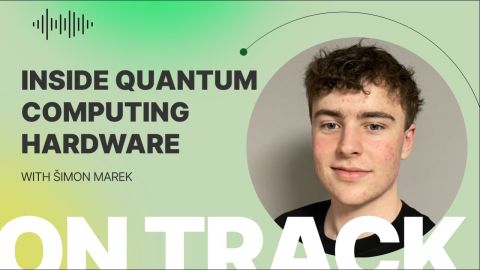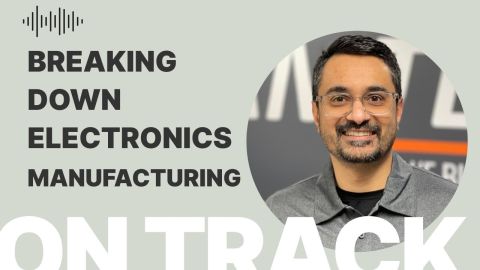PCBs, Global Innovation Policy & the CHIPS Act

Explore the intersection of Global Innovation Policy and the CHIPS Act with Stephen Ezell, VP of Global Innovation Policy at the Information Technology and Innovation Foundation (ITIF), in this insightful episode of the OnTrack Podcast.
Hosted by Tech Consultant Zach Peterson, this discussion delves into the complexities of navigating the Chinese market, the principles of comparative advantage, and the critical role of policy in fostering technological self-sufficiency. Discover how the CHIPS Act aims to bolster the electronics industry and innovation within the global tech landscape.
Listen to the Episode:
Watch the Episode:
Key Highlights:
- ITIF's Role and Background: Explore the foundation and mission of ITIF, shedding light on its significance in policy discourse.
- Hardware vs. Software in Policy: Delve into the nuances of hardware and software considerations for policymakers, shaping discussions on technological advancement and regulation.
- CHIPS and Science Act: Examine ITIF's involvement in the CHIPS and Science Act, emphasizing its implications for innovation and industry development.
- Global CHIPS Act Comparisons: Compare the CHIPS Act with similar initiatives worldwide, providing insight into its effectiveness and relevance on a global scale.
- Policy Perspectives on Economic Dynamics: Analyze key questions surrounding industrial policies, including the CHIPS Act's role, potential handouts, and the broader implications for economic strategies like onshoring and friendshoring, in the context of China's economic evolution.
Resources:
Transcript:
Zach Peterson: And this is funny because you just brought up something which I sometimes hear on CNBC and Bloomberg, that so many big name companies are trying to break into the Chinese market, and that could be a real new source of revenue if they can do that. And I think it's just kind of assumed that they can just go over to China and sell their products. And really the Chinese government doesn't want that. They want to be more self-sufficient, especially in terms of technology.
Stephen Ezell: When we created the World Trade Organization after World War ii, we did so on required in theory of comparative advantage, nations specialized at what they produce best and trade with other countries and other companies they're from in a way that maximizes global economic output. Right? Well, in our view, China fundamentally rejects that vision.
Zach Peterson: Hello everyone and welcome to the all TM OnTrack podcast. I'm your host, Zach Peterson. Today we're talking with Steven Zel, vice President of Global Innovation Policy at the Information Technology and Innovation Foundation. ITIF has done considerable work on the CHIPS Act and is an advocate for information technology and innovation specifically in the electronics industry and related industries. And we're very happy to have him on the show. Steven, thank you so much for joining us today.
Stephen Ezell: Thank you, Zach. Pleasure to be here.
Zach Peterson: So ITIF is probably not a four letter acronym that most folks in the electronics the electronics industry are aware of. There are other industry advocacy groups that I think are much more familiar. So if you could please tell us about ITIF and what the organization does.
Stephen Ezell: We're a Washington DC based science, technology and economic policy Think tank, a 5 0 1 C3 nonprofit educational foundation. And our mission broadly is to advocate for public policies, laws and regulations that drive innovation based economic growth in the United States and our states and countries around the world. We have teams inside our foundation who focus on various facets of innovation across vertical sectors of the economy, from biotechnology to clean energy to telecommunications. It's like a center for data innovation. I personally lead the work we do in advanced manufacturing, advanced technology industries such as semiconductors, quantum computing, high performance computing and life sciences. But broadly we try and communicate with policy makers, with members of the administration, with the press and the public to advance a positive view of innovation for the benefit of Americans and humankind.
Zach Peterson: So I think the next natural question to ask is how did ITIF recently come to be involved in policy issues relating to the electronics industry, especially in the United States?
Stephen Ezell: Well, maybe to tell the story even further back, we're located here in Washington where we co-locate with the Information Technology Industry Council, ITIC. It's kind of the lobbying organization for the US ICT industry. But around 20 years ago, the founder of ITIC wanted the seed formation of a think tank that would elevate the discourse on the importance of information technology to the economy and to society to a higher level. And so, and a few companies the very beginning got together and helped ITIF get off the ground. So working on electronics and ICT policy has been core and foundational to our work ever since. And semiconductors, printed and circuit boards, these are foundational to the entire digital enterprise. They are the brains that literally and figuratively power every single electronic device and a rate downstream application of ICT from big data to ai. So we have been deeply embedded in this field for a long time. And I should also add that I lead global innovation policy. So I do our global work on these issues and obviously that enrolls a lot of discussions around these technology areas in China, the rest of Asia, Europe, et cetera. So kind of this link between global competition for leadership and advanced technology industries has been very important to us.
Zach Peterson: Now in your backstory of ITIF, you mentioned something important, which is of course a recognition that electronics really is the backbone of all of this other stuff that we enjoy every day. But one of the things that I've highlighted quite a few times, at least in terms of the consumer level or the popular view of the word tech, is that most people totally gloss over the hardware side of it and they just look at Facebook and Google and those kinds of companies and they just think, oh, software that's tech. Is that the same perception that you see when you talk to policymakers?
Stephen Ezell: Yeah, historically, certainly up until the pandemic, if you take A-T-S-M-C, the Taiwanese Semiconductor Manufacturing Company, the most important company in the world no one knows about. But it goes, I think what Arthur Cleric said that any sufficiently invest technology is indistinguishable from magic. In a way it, it's a good thing that these technological systems have evolved so that you can rely on your cell phone or you can rely on your autonomous vehicle or what have you. But it does mean that I think a lot of times people just assume electricity or the plumbing shows up at their house without really understanding all the technology that goes into a building and sustaining
Zach Peterson: It. I mean, I think that's understandable. It's kind of invisible in the background. Unless you're a tinkerer, you've probably never pulled open an old cell phone and realized, oh yeah, there's a bunch of chips and a circuit board in there.
Stephen Ezell: And another aspect of this, which you may want to get into is the reality that our education system produces fewer and fewer electrical engineers and computer scientist every year. Last year, more students in high school in California took pottery than to computer science. So I think one of the challenges we have is if we're not educating or citizenry, I'm not saying everybody's got to go and become an AI programmer or a chip designer, but there's got to be among our some basic understanding of engineering and these technologies, I think for people to more appropriately understand and evaluate and value them.
Zach Peterson: I totally agree with you and I think this can put us in a position where we get issues like we had during the pandemic. And then the fortunate outshoot of that was of course the Chips and Science Act. You guys, as I understand it, were champions of the Chips and Science Act. Could you tell us the work that you did on that and whether it was working directly with policymakers or some of the advocacy work?
Stephen Ezell: And it's important to understand that we are kind of upstream in the idea value chain in Washington dc, right? So we don't write legislation ourselves. We don't go into congressional offices and lobby for a specific piece of legislation. What we'll do is we'll go in and say countries like Germany or Taiwan have these applied industrial research institutes like a Frown hopper center, and they bring universities and industry together to develop and diffuse technologies for our industry. US has to have a mechanism like this. So we should create something like the National Network for Manufacturing Innovation. So we're looking out in the world and seeing what policy ideas are driving tech and innovation and then being a source of ideas for policy makers in Washington dc. So with the Chips and Science Act, and your listeners probably know, just be clear, what that is is literally the merging together of two different pieces of legislation.
The CHIPS Act was being developed under one route of through folks like Senator Cornin, and of course that's the 52 billion we have now to support the US semiconductor sector, 39 billion for incentives and 11 billion for RD. But separately, it was coming the Science Act. This ultimately was 200 billion of authorized funding. And to tell the backstory there, I'd actually gone to Georgetown University in Washington DC and a guy named George Shambaugh was the Chief Economic Policy advisor for Senator Todd Young of Indiana and reached out to me and said, do you know if the senator would like to work with some senators on their side of the aisle to develop competitive legislation for the United States? I said, well, I know the team in Schumer's office. She's talked to them. So they actually put the Senator Young and Senator Todd Chi together, and they sat down originally and wrote this a hundred billion dollars Endless Frontiers Act.
That was the original piece of legislation that through various machinations between legislative texts passed by House and Congress became the Bipartisan Elimination Act and ultimately what was all brought together last August and this Chips and Science Act. But ITF was at the groundwork of laying the congressional groundwork for this. Also, there's a number of specific elements within the legislation that we specifically IDed and championed. For instance, there's was authorized 10 billion to build the regional technology hubs across the United States. So looking at, if you will, second tier tech cities, Nashville, Rochester, salt Lake, we know we have the anchors in Silicon Valley and Seattle and San Diego and New York said, how do we get more inclusive opportunity in the innovation economy across our society? By the way, just basically why that matters. We did a study, we looked at where our innovation jobs down in the US economy, we define those as being jobs in companies that invest certain the share of their revenue each year in RD, so their RD intensity and then the number of STEM workers. Essentially what we found was that one third of US innovation jobs are found in just 14 US counties and half in just 40 US counties. So that suggests there's a real inequality of innovation opportunity, if you will in the United. So that was an important piece of legislation to more broadly diffuse the tech capacity and ecosystem across the United States.
So we were involved with a lot of the specific programmatic elements that came out of legislation, and then of course we did a number of events ourselves and reports and papers and testifying to Congress about the importance of this type of legislation. So we were, I think, an important champion to help it cross the finish line.
Zach Peterson: So expression I've heard about legislation is that sometimes it's like sausage, you don't want to know how it's made or you don't want to watch it made, but maybe you'll like the outcome. One thing I'm wondering here about the kind of foundations of this and how it all evolved is how does the CHIPS act compare to industrial policy of other nations? I bring this up because in I think last year or probably the year before, I was speaking with General Rob Spalding and I brought this up to him, that he had mentioned that countries like Germany and Japan, they have a national industrial policy, and I think for a long time we didn't really have an industrial policy at the same level or the same robustness that these other nations have. So I'm wondering if the CHIPS Act was originally intended as a way for us to maybe get on par with those nations or catch up with those nations or mimic what they're doing.
Stephen Ezell: Yeah, I think there are a couple elements to that answer. First, one key point for your listeners to understand Congress, there's a difference between authorization and appropriation. So even though Congress has authorized this 200 billion over five years for the science part of it, and if you look at that regional tech hub, which I mentioned Congress authorized 10 billion for it, but so far has only appropriated a billion dollars for it. So even already we're seeing a significant gap between the authorizations and the appropriations. Policymakers like to throw out big huge numbers, but then some money really getting delivered. We'll see in budget cycles going forward. But one reason on the science side that was important is because federal investment in r and d as a share of GDP has recently declined to lower than it was in 1953 before Sputnik. So yes, of course the US does still invest the most in the world for the federal government in r and d, but when you look at the real intensity level of that r and d is a share of GDP.
In countries like Israel or Korea or Finland, it's going to be four or 5%, and the US is around 2.8%. So we're in ninth among OSCD nations and r and d and cities. That's why it's important that we invest more because we need that relative to the size of our economy. Now, coming to your question about industrial policy, right? And of course this is a very fraught question. What is industrial policy? If you roll the tape back and if you remember this firm called Cuero, but Cuero was a firm which started by the French government from the ground up, funded by the French to go out and be the European Google killer. It was going to be Europe's answer to Google. It was like when France created a group bull. It was a mainframe company in the 1960s to compete against IBMI dunno, to us at ITIF industrial policy because one country is anoint specific national champions in certain industries like electronics or steel or shipbuilding or cars.
A good example of this, and it's important to understand, let's take China. China has created from the ground up a company called YMTC, yang C Memory Technology Corporation. It's a dram, a memory chip manufacturer. This is a company started with 25 billion of Chinese government money from the ground up go compete in global semiconductor memory chip markets. That's really industrial policy to us. Innovation policy is when we're saying how can we collaboratively build public private partnerships like we do with SYMTECH for the semiconductor sector in the 1980s? That's an important part of this National Semiconductor Technology consortium that's going to come out of now the CHIPS stack. How do we build platforms for collaborative public private sector RD? That's very much what the German system with the frown hopper is modeled after. But whatever language you want to use to parse this broadly, the answer is yes, that the OS has not had even a European style of intentional public support for the competitiveness of certain sectors of the economy.
Now, we did have it, of course, with semiconductors, with Symtech in the 1980s. Now, the great irony of course of US semiconductor policy over the past four decades is of course we invented the semiconductor that had 50% of the global market share in the 1970s. Japanese competition comes in the eighties, almost crushes our industry. So we respond effectively with the Symtech Research Consortium and it actually works and it actually restores US leadership in the sector during the 1990s. And then it gets, wow, we feel good. We don't need this anymore. So we let Symtech go by the wayside. We kind of, at least on the manufacturing side, now the business models needs to change. We can talk about that. But ultimately the point for your listeners is that in 1990, the S accounted for 37% of global semiconductor manufacturing and that share has followed a 12% today.
That's a 70% decline in our share of semiconductor manufacturing. Now what happened, of course, when you look at the broader economics of the semiconductor industry, US-based companies still command 47% of market value in the global semiconductor industry. And that's because we have very strong design firms like Nvidia, A MD, apple, Qualcomm, and there's tremendous value added from designing the chip. But in terms of the manufacturer of it, that's largely gone offshore and today 92%, the world's most sophisticated semiconductors, those at that sub seven, sub five nanometer level are coming from Taiwan. Right? So the intent of the CHIPS Act here was to say, especially coming off the wake of the COVID-19 pandemic and this semiconductor shortages we encountered as a result of that is to say, if the United States only makes 12% of the world's semiconductors, and if 92% of the world's most sophisticated semiconductors are coming off a politically, typically contested island in the South China Sea for our own national and economic security purposes, there's a compelling need to invest in considerably expanding US semiconductor production activity.
Zach Peterson: One of the criticisms of the CHIPS Act is I think, is that it's seen as a handout and it is picking winners and losers, and you're really saying that's not the case at all. It's really not following the picking of winners and losers that might've happened in the past or happen overseas. Am I hearing that correctly?
Stephen Ezell: I think I contextualize it slightly differently in a couple of ways. First, the reality is that nations have moved from being price makers to price takers in global marketplaces. And then what I mean by that is globalized companies now shop the world and they say, US, Israel, England, Germany, Brazil. What do you have to offer us in terms of the best pools of skilled talent, the best digital and physical infrastructure, the best tax policies, the best regulatory regime? How easy is it to do business? Some semiconductor companies consider over 500 factors when choosing to cite a fab, right? So companies or countries and states or regions therein are competing fiercely to win on all these factors. And what's come to take place in this industry over the past several decades is that Hungary, nations like Korea, Taiwan will say to these semi Mexican firms, firms, we will offset $2 billion of you putting a fab here.
And of course, a leading edge fab is now a 20 billion investment. I'll say, well, we'll offset some of your energy consumption costs to fray your taxes. If you need a road or a rail facility built there, happy to help you out. And so according to a Boston Consulting group report, foreign government incentives can reduce the upfront capital expenditures for land construction and equipment in building a fab by up to 15 to 40% of the 10 year total cost of ownership of the fab. And the BCG report found that the 10 year total cost of ownership of US based semiconductor fabs is 25 to 50% higher than in other locations with government incentives in those countries, accounting for 40 to 70% of the US TCO gap. So really what the incentives that the CHIPS Act intends to offer is a mechanism for the US to provide a means to offset those types of incentives that other countries are offering.
And it's critically important to understand this point. So the OACD did a study looking at subsidies in the global semiconductor industry from 2014 to 2018. They looked at 21 of the world's largest semiconductor companies. What they found was that 86% of the subsidies they could identify went to Chinese firms. And again, this is a key point. What is the subsidy? So in China's case, for firms like sic, which is their semiconductor manufacturer, they found that 40% of SICs revenues were in fact a direct government handout to the bottom line. 40% of S mixed revenues was government money. That's a subsidy, right? So what we're talking about here is what that means is that the government is capitalizing the firm to enable it, to sustain it, to compete in global markets in a way that it would not be able to do if it was required to earn a market-based rate of return.
That's not what is going on with the US Chips Act, right? We're not capitalizing Intel, not bail out Intel if we build out General Motors, right? We're providing a pot of money that offsets some of the types of investment incentives that other countries offer. And it's critically important to understand that this is a fundamental and huge difference. So is it picking winners as you say, well, building a $20 billion fab at most these companies are going to get maybe 10% of that investment. So is it enabling? Is it helping? Is it sustaining? Okay. But I wouldn't say that we're now anointing a US semiconductor champion the way France did with Group Bull. It's also important to recognize that the subsidies, incentives and grants that are in the ships act are available to companies of all corners of the world so long as they've not been designated foreign adversaries. So it looks likely once the CHIPS funding starts to flow. In fact, the very first CHIPS funding that was offered was to BA systems. So a European company that has a semiconductor facility that makes some of the parts for the F 35 fighter was one of the first to get the funding. So I think that's another important difference to understand that this is not just picking us winter companies, but it is to help build a competitive ecosystem for like-minded allied nations to be able to compete in this industry.
Zach Peterson: Okay, thanks for clarifying that because this is one of the criticisms I've seen multiple times within my professional network on LinkedIn, and I've seen some posts using the term socialist to describe it, and I don't know that that's necessarily appropriate, so thank you for that. But one other thing that I'm wondering here is stems from a conversation that I had with Happy Holden on another episode. So he was in the industry during the time when the Chinese and Taiwanese industrial policy was helping them grow their PCB production capacity back in the 1980s, and he broke it down pretty clearly as far as cost comparisons between building your captive manufacturing operation in let's say Virginia versus building it in Taiwan. When he put it in those terms, it became pretty clear why it was so attractive and what the momentum was for taking all this production capacity overseas. So how does chips and science compare to that time period where the Taiwanese were providing incentives to get companies to outsource their production overseas? Were they doing just direct subsidies or were they doing more of a chip sack style innovation management type of approach?
Stephen Ezell: It's interesting you asked that particular question. Now, working on the study that will make a comparative assessment of the strengths and weaknesses of the national innovation systems of the US against China, Korea, Taiwan, and Japan, and of course, I mean go back to Taiwan. I mean, there are a number of factors there that were so important to the development of their PCB and semiconductor sector. Of course, there you had a very active set of industrial policies, the support of public research institutes, notably in Taiwan, the Industrial Technology Research Institute, which intentionally was designed by the Taiwanese government to find ways to acquire Western technologies. In fact, the start of the Taiwan industry for semiconductors was they got a license from RCA for CMOs technology. And a lot of that actually came out of US antitrust policy in the fifties and sixties that forced our companies to divulge that intellectual property.
So the time when these government essentially would go out, see where they could acquire foreign technology, use that as a basis throughout industry, then come along with what you said, oh yes, we have a lower cost production environment, now we can do this. And that was instrumental in encouraging the offshoring of a set of US manufacturing to lower cost sectors. I think another critical point in this is US companies made very serious mistakes. I mean, Morris Chang, as I have read the history or to Texas Instruments, of course, Morris Chang, founder of TSMC came up with a fabulous business model. The idea that most companies heretofore like ITM TI Texas Instruments had been these integrated device manufacturers. You do all of the design fabrication and a TP in-house. And then what he did, of course, was broke that integrated model by saying, Hey, we'll just focus not on design, but solely on the fabrication the chips, we can protect your ip. But Morris took that idea to ti and the executives at TI turned down that idea, right? I mean, the US could have had TSMC, right? So I think that Taiwan has come to lead in this sector, yes, was a result of effective industrial policies, was also a failed by some of our businesses to explore new business models that might've been disruptive to their sector.
But this question does come up a lot. Like what's different now? How can we be certain that the investments we're making now deliver sustained returns? And we don't go back to the old situation we found ourselves in. And I think it's important to have a broader discussion here of the history of US manufacturing because, and my colleague, our president, Rob Atkinson, actually wrote a book on this called Innovation Economics, the Race for Global Advantage. But really since the 1990s in Washington DC, there has been an attitude that the United States does not need to be manufacturing. We shouldn't be manufacturing the us. In fact, if you remember Lawrence Summers, Lawrence Summers, who was the chair of the economic advisors at the start of the Obama Administration said, quote, America's role in the global economy is to be a provider of ideas and services. It is not to make things.
:
The head of the Peterson Institute for International Economics here in Washington, DC was once asked, how much manufacturing does America need to have to remain a high value added high wage economy? And he said, really, America could lose all of its manufacturing and be just fine. There has quite seriously been an attitude among economists and policy makers in this town that manufacturing does not matter. And that was actually exacerbated in our view over the past several years. I dunno if you know Clayton Christensen up at Harvard wrote this wonderful book called The Innovator's Dilemma, the Innovator Solution. But what he points out is that the financialization of the US economy in the two thousands meant that all CEOs were focused on one thing, rona, return on net assets. If you maximize that rona, then that allows us to compare the profitability of a bank against an airline, against a manufacturer, right?
So what was the OS response in boardrooms across the country? Get rid of your assets. If you offshore your assets, you boost your own up. So in our view, what I'm trying to say is if it's going to be different now, it's only going to be because economists, CEOs and policy makers understand that manufacturing matters to sustaining a high wage, high value added US economy. One also capable of defending itself in case of wartime or pandemic. And if we now have this understanding that it matters to invest in these industries and these sectors, then it might be different. But yeah. So what happened? Yeah, we started moving stuff off shore and then a agglomeration effects in places like Shinzen and Taiwan just meant that at some point because all the component, the cabling, the pcb, since it was all made there, the entire look of civil at Charex manufacturing shifted from the United States to Asia in about a 20 year period. And our policymakers were with us at the time about
Zach Peterson: Everything that you just said. You mentioned us, but I think you could remove the word United States and put in Europe. Absolutely. I think 99% of what you just said would be equally applicable.
Stephen Ezell: Absolutely no, and even worse, in Europe's case, I mean, yeah, Europe's happy to make cars and maybe some yachts in Italy, and of course they have A SML in Holland and Sweden sees it totally differently than the rest of Europe to be sure. But yeah, I mean England, I mean, I mentioned our book and the second chapter of our book is about the industrial decline of Britain in the post World War II era, and it's a staggering tale of, I want to be clear where AYA stands, our view is that the choice is not between all government or no government support for innovation in tech industries. It is what's the right level of support for government innovation. But I think in the English case, with respect to our British friends, they took laissez-faire approaches to the extreme and almost entirely lost all their manufacturing sector. I mean, they have what? They have some engine manufacturing and a couple, some of my firms, but our book talked that it was the biggest industrial decline for any nation in known history for
Zach Peterson: The uk. I had no idea about that, but I'm going to have to read about that. So I think that begs the question, now that we've done this in the us, should the EU or individual European nations implement similar approaches, not the approach of France where they're trying to pick winners and losers, but really an innovation management kind of approach that is enshrined in the Chips and Science Act?
Stephen Ezell: Yeah, no, they showed, and they are Germany's putting 20 billion forward for its semi semiconductor sector, and the EU actually has its own European chips Act, that's what they called it, 47 billion that they have put forward, again, a mix of r and d and incentives to attract the manufacturers. We actually used a report called an allied approach to semiconductor comp competitiveness, which tries to make the case that to ensure that these policies don't lead to over capacity or not a coordinated Colette of investment like-minded countries should be collaborating to some degree to invest in r and d efforts for what comes beyond Moore's law type of approaches. We should be coordinating amongst ourselves to ensure that there's a saying that exists with export credit, and it's a deal now between Airbus and Boeing about how they will handle export credit financing. It's called the OECD aircraft understanding. So some ideas like that for how we can ensure that the competition we want to have in this sector unfolds not in a protectionist way, but in a market based way.
Zach Peterson: Yeah, I think that's another danger of these types of policies is that you start to see protectionist policies start to arise and then you get tariff wars and things like that that we saw about eight years ago. And Im wondering
Stephen Ezell: Right now, so you look at all the back and forth between US and Europe over the solar panels and the electric batteries and electric vehicle aspects of the IRA. Yeah, that's gotten very much protections that the incentives are only available to manufacturers if they're here in the country. Yes, it's very important that competition, this micro sector does not go the route as it's evolved in the clean energy sector.
Zach Peterson: Yeah, I see kind of a danger here because if you don't have enough capacity locally, but then you have these protectionist measures, it forces you to procure offshore and then you've really done nothing to reduce costs. In fact, all you've done is increase costs for companies who are trying to produce end products. Obviously we've been talking a lot about semiconductors, but without a printed circuit board, the semiconductors are kind of meaningless. And the differential between overseas production in Asia, specifically in the Chinese market share versus production in the US and Europe is massive. You could drive a semi-truck through it. So I think that begs the question, would a PCBs act succeed in creating the same kind of results that we want to see with the Chips and Science Act? Can we take an innovation management approach with PCB manufacturing or is PCB manufacturing just such a race to the bottom on price that a different approach is needed to try and geographically diversify that part of the supply chain?
Stephen Ezell: Yeah, I mean, my view is that we can should, I mean when we talked about sub manufacturing, we said the US share fell from 37% to 12%. If the CHIPS act is a wonderful success, maybe we'll get it back up to 20%, right? So in a light manner, when you look at the US share of PCB production, that was about 25% in 2000 and fallen just 4% today we're 9% decline. China manufactures 56% of the world's PCBs. Now between China and Taiwan, that gets up to 70% rest of Asia is over in the nineties. So yes, we have in PCB is a massive dependence on Asian production today as well. And this is why the US industry, the Prince Circuit Board Association of America has worked with several congress members, including Blake Moore of Utah and Anna Eshu, California to advance this protecting circuit boards and substrates act, which much like the CHIPS Act would provide a 25% tax credit for the purchase requisition of American made permanent circuit boards and offer 3 billion in incentives for a financial assistance program for companies or facilities manufacturing or doing research on PCBs. I think we absolutely need this as well as Travis, Kelly and David Shield of the P-C-B-A-A say that semiconductors don't float. They need to be on a substrate and then on a printed circuit board that PCB needs to be secure just like the semiconductor itself does. And when you're only manufacturing 4% of the world's supply and then only mostly for very specific defense purposes, I think that introduces a national security vulnerability and economic dependence that US policymakers would be wise to address as
Zach Peterson: Well. Yeah, I think one of the big criticisms of just reshore everything that comes up and really gets applied hard to PCB production is, well, do you want to pay a thousand dollars for your toaster oven? And it's because I think a lot of products that use PCBs really are price sensitive. I mean, there's not sensitive ip, it's not being used for defense purposes or anything like that. You don't have a lot of advanced components in it. So it kind of could be manufactured really anywhere and you, you're not putting yourself in any economic danger until you geographically concentrate everything in one place. And then natural disaster, geopolitical pandemic, whatever creates that supply chain risk. So if we can't do it all in the US due to such extreme price sensitivity, is it appropriate to implement some kind of innovation management or industrial policy that takes it to French shoring? So let's say Latin America, Canada, something like that?
Stephen Ezell: Yeah. My organization released a report last week assessing how one country in Latin America, the Dominican Republic, could assume a greater role in PCPE or some test and packaging value chains. Yeah, I think there's substantial opportunity to bring this type of production back to like-minded hemispheric countries in the Americas. I think if you look at the Dominican Republic, their hourly manufacturing cost is just 6% out of the United States. So that's why they actually have a very robust electronics manufacturing industry down there. Mostly it's circuit breakers in junction boxes, but could it come do like that? Do they have the base of skills and electronics manufacturing know how to make the jump up the value chain into PCBs? Yeah, I think they could. Mexico, Costa Rica are obviously getting in the space as well. Mexico, that's a fair amount. I don't know the percentage, but I know that they do a lot of the PB baseboard manufacturing for Rockwell Automation and Ton Corporation and stuff like that. Yeah, no, but this is a critical point that with some, it doesn't all have to come back to the United States, but I think it's a win if some more share of it does come back to the United States. Can we get that back to 10%? Can we get it back to half of what it was at the start of this millennium? And then can we get more of it going to friendly nearshore places across the world? By the way, this leads me to another point that I like to make.
Our view is that China's economic strategy has fundamentally evolved since the 1980s along the following trajectory. Initially it started with an attraction strategy, d xing comm manufacturer here, far lower labor costs environment lot sizes of a million. So the attraction was largely the Chinese strategy. Up until Xi Jing comes into office and around the mid 2010s, it turns to much more of what we call a compulsion economic strategy. Okay? You have to manufacture here. If you want to sell to our market, you have to transfer IP or technology. If you want to sell what China called trading market for technology, we argue that it's now evolved to an expulsion strategy. So if China has a domestic competitor that can suffice for the local market, the foreign enterprises are no longer invited to service that marketplace. So we see this, there was an initiative called DIOE, this was a D, Intel, Oracle and EMC. And the Chinese government literally went around all thees and said, you're getting these companies products out of your business. So here's the situation we encountered right now, 36% of US semiconductor industry sales go to China.
Now, this is why when we debate issues like export controls in Washington dc, the industry are probably says, well, if you don't let us sell to China, then we can't earn revenues that we need to reinvest in future generations of innovation. That's exactly right. But here's the conundrum. China wants your share to be zero. If China could wave a wand and have its way with its trillion dollars, its invested in the semi sector over the past decade, you wouldn't sell anything in China. So how do we deal with that economic game board? And the only answer is that we intentionally design a world where in a decade our semiconductor companies say only 15% of our sales have to go to China. Why? And how? Well, because we're making the world's laptops and servers and mobile phones and friendly of places like India or South America, that the US policy makers intentionally rearchitect the global economic game board in advance industries in our economic favor. That's what policymakers in Washington should be doing. And if we can do that, then we can help our own companies get out of the box that they find themselves in needing to sell a third of their products to a country that wants nothing more for their product sales to be 0%.
Zach Peterson: Interesting conundrum, and this is funny because you just brought up something which I sometimes hear on CNBC and Bloomberg, that so many big name companies are trying to break into the Chinese market, and that could be a real new source of revenue if they can do that. And I think it's just kind of assumed that they can just go over to China and sell their products. And really the Chinese government doesn't want that. They want to be more self-sufficient, especially in terms of technology.
Stephen Ezell: When we created the World's trade organization after World War II, we did so on required and theory of comparative advantage. Nations specialize at what they produce best and trade with other countries and other companies. They're from in a way that maximizes global economic output. In our view, China fundamentally rejects that vision. So in theory, China should be totally happy with making PVS or chotkis or what have you, and trading for a Boeing aircraft for instance, right? But China doesn't accept that China wants absolute advantage in all advanced technology industries. They want to lead in high speeded rail in semiconductors and solar panels and networking equipment. And of course, more broadly what they want is unfettered access to global markets while the ability to control their own and be auto and mistic in their own market. So this is a vision of economic trade craft. This is what, there's a term for this called powertrain.
It's what actually the Germans practiced in 1910s and 1920s. But in our view, we're dealing with the competitor that fundamentally rejects the structure of the global economy that the United States and LA countries stood up in the pulse war era. And we need to be wise to the fact that China's playing an entirely different game than we are, and it's had a massive impact. And it's a good reason with PCBs is just one example of ministry of how they've come to clean 56% of the market share, or they had virtually nothing 40 years ago. By the way, look at just solar panels. In 2008, China made 6% of the world's solar panels. By 2018, they made over 70% complete change. And it's because we used policies like massive industrial subsidization to build these industries from the ground up and dump products in global marketplaces on non-market based terms or response in these types of industries needs to be wise to these dynamics because in our view, at least at ITIF, that's the nature of the way the game is being played in the global economy. And if you want to do things like get more semiconductor, more PCV manufacturing back here, we just got to be wise to the dynamics of the global marketplace in which these sectors can be.
Zach Peterson: Sure, I understand. And I guess the end goal here is not to say, well, they can't manufacture anything. It's more to say, well, we want some more market share. And I think ultimately this benefits everybody, whether you're a small startup company trying to scale or whether you're a large OEM, because now you have much greater access to the components and materials that you need to build your products and serve your customers.
Stephen Ezell: And to be clear, and we want nothing more than for China to fully comply with this WTO commitments and conduct its trade and economic fairs in a way that it's committed to for its partners because nations agreed that that would be the best way to maximize global warfare. But if that's not going to be the case, then we got to be wise that it has an effect on industries and our workforce and compete accordingly.
Zach Peterson: Well, this is all so interesting, and it's certainly an area that I probably need to do some more reading on so I can learn more about all of this, but I want just say thank you so much for joining us to talk about all this stuff. Of course, very relevant in the post covid era and I'm sure going to continue to be relevant going forward in the near future.
Stephen Ezell: Zach, thanks so much for the invitation. I've enjoyed it.
Zach Peterson: Thank you so much to everyone that's out there listening. We've been talking with Steven Zel, vice President of Global Innovation Policy from the Information Technology and Innovation Foundation. If you are watching on YouTube, make sure to hit that like button, hit the subscribe button. You'll be able to keep up with all of our podcast tutorials and episodes as they come out. And last but not least, don't stop learning. Stay on track, and we'll see you next time. Thanks everybody.










